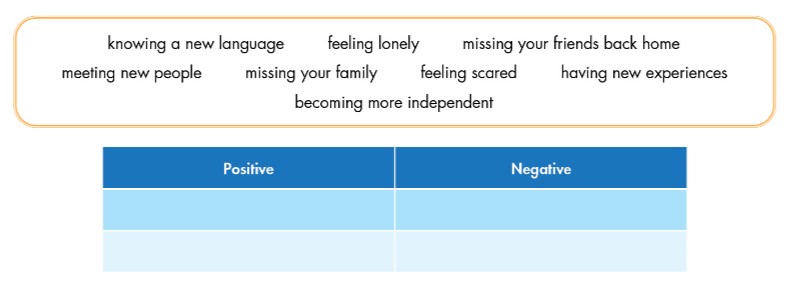Lesson 3 - Unit 6. Education - SBT Tiếng Anh 7 iLearn Smart WorldListening a. Listen to a phone conversation. Does the girl like studying abroad?. b. Now, listen and fill in the blanks. Reading a. Read a magazine interview with Jacques. What is the main idea of this paragraph?. b. Now, read and fill in the blanks.. Writing skill: Unscramble the sentences. Use the skill box to help you. Planing: Fill in the table with positive and negative things about studying abroad. Writing: Now, use your notes to write a paragraph about the positive and negative points of
Lựa chọn câu để xem lời giải nhanh hơn
Listening a a. Listen to a phone conversation. Does the girl like studying abroad? (Nghe một cuộc trò chuyện điện thoại. Cô gái có thích du học không?)
2. No (Không) Phương pháp giải: Bài nghe: Daughter: Hi!, mom. Mom: Hi, sweetie. How is everything over there? Daughter: Well, everything is different here.It's very exciting. I'm making lots of friends. However, it's not all great. I hate most of the food. They eat so much meat here. Mom: Oh! Daughter: Yesterday I only had a small salad. Tomorrow I will bring my own lunch. I miss your cooking at home. Mom: Oh dear. Daughter: It's not all bad though. School is fun. Although I'm learning a lot.I don't understand everything. But it's okay. My friends explain the lessons to me so I don't miss anything important. And I don't have to wear a school uniform. Mom: That sounds lovely. Daughter: It is.Oh, and guess what? Last night it snowed a lot. It was so beautiful. We made a big snowman this morning. I'm having a good time, but I can't wait to come home. I have lots of photos to show you. Tạm dịch: Con gái: Chào mẹ. Mẹ: Chào con yêu. Mọi thứ ở đó thế nào? Con gái: Chà, ở đây mọi thứ đều khác, rất thú vị. Con đang kết bạn rất nhiều. Tuy nhiên, nó không phải tất cả đều tuyệt vời. Con ghét hầu hết các món ăn. Họ ăn rất nhiều thịt ở đây. Mẹ: Ôi! Con gái: Hôm qua mẹ chỉ ăn một món salad nhỏ. Ngày mai con sẽ mang bữa trưa của riêng mình. Con nhớ món ăn mẹ nấu ở nhà. Mẹ: Ôi trời. Con gái: Nó không phải là tất cả đều xấu . Trường học thật vui. Mặc dù con đang học rất nhiều nhưng tôi không hiểu tất cả mọi thứ. Nhưng nó ổn mà. Bạn bè của con giải thích các bài học cho con để con không bỏ lỡ bất cứ điều gì quan trọng. Và con không cần phải mặc đồng phục học sinh. Mẹ: Nghe thật đáng yêu. Con gái: Đúng vậy. Ồ, và đoán xem? Đêm qua tuyết rơi rất nhiều. Nó rất đẹp. Chúng con đã làm một người tuyết lớn vào sáng nay. Con đang có một khoảng thời gian vui vẻ, nhưng con không thể chờ đợi để trở về nhà. Con có rất nhiều ảnh để cho mẹ xem. Lời giải chi tiết: Đáp án: 1. Yes. The girl likes studying abroad. (Có. Cô gái thích việc đi du học.) Thông tin: School is fun. Although I'm learning a lot. I don't understand everything. But it's okay. My friends explain the lessons to me so I don't miss anything important. And I don't have to wear a school uniform. (Trường học thật vui. Mặc dù con đang học rất nhiều nhưng tôi không hiểu tất cả mọi thứ. Nhưng nó ổn mà. Bạn bè của con giải thích các bài học cho con để con không bỏ lỡ bất cứ điều gì quan trọng. Và con không cần phải mặc đồng phục học sinh.) Listening b b. Now, listen and fill in the blanks. (Bây giờ nghe và điền vào chỗ trống.)
1. The girl is making lots of ____________________. 2. She misses her mom's ____________________ at home. 3. She doesn't need to wear a ____________________. 4. It ____________________ last night. 5. She has lots of ____________________ to show her mom. Lời giải chi tiết:
1. The girl is making lots of friends. (Cô gái đang kết giao nhiều bạn.) 2. She misses her mom's cooking at home. (Cô ấy nhớ mẹ cô ấy nấu ăn ở nhà.) 3. She doesn't need to wear a school uniform. (Cô ấy không cần phải mặc đồng phục học sinh.) 4. It snowed last night. (Đêm qua tuyết rơi.) 5. She has lots of photos to show her mom. (Cô ấy có rất nhiều ảnh để cho mẹ xem.) Reading a a. Read a magazine interview with Jacques. What is the main idea of this paragraph? (Đọc một cuộc phỏng vấn trên tạp chí với Jacques. Ý chính của đoạn văn này là gì?) 1. Jacques's favorite thingsabout America (Những điều yêu thích của Jacques về nước Mỹ) 2. Jacques's opinion aboutstudying abroad (Ý kiến của Jacques về việc du học) Today we spoke to Jacques. He's from France. He's currently here in America on a one-year study program. Here's what he told us. " Many students study overseas. They can learn about the culture. They can also test their language skills. However, being away from home can be hard. The food is different, but trying new things can be a great adventure. Although studying abroad can be scary, you can keep in contact with your friends and family on social media. You can make lots of new friends. You can discover new hobbies, too. " Jacques said he loves America. He has another four months here. Phương pháp giải: Tạm dịch: Hôm nay chúng tôi đã nói chuyện với Jacques. Anh ấy đến từ Pháp. Anh ấy hiện đang ở Mỹ theo chương trình học một năm. Đây là những gì anh ấy nói với chúng tôi. "Nhiều sinh viên du học ở nước ngoài. Họ có thể tìm hiểu về văn hóa. Họ cũng có thể kiểm tra khả năng ngoại ngữ của mình. Tuy nhiên, xa nhà có thể khó. thật đáng sợ, bạn có thể giữ liên lạc với bạn bè và gia đình của mình trên mạng xã hội. Bạn có thể kết bạn với nhiều người bạn mới. Bạn cũng có thể khám phá những sở thích mới. " Jacques nói rằng anh ấy yêu nước Mỹ. Anh ấy còn bốn tháng nữa ở đây. Lời giải chi tiết: Đáp án: 2. Jacques's opinion aboutstudying abroad The main idea of this paragraph is Jacques's opinion aboutstudying abroad. (Ý chính của đoạn văn là ý kiến của Jacques về việc du học.) Reading b b. Now, read and fill in the blanks. (Bây giờ đọc và điền vào chỗ trống.) 1. Jacques is from ____________. 2. Students studying abroad can ____________their language skills. 3. Trying new things can be a great,________________. 4. You can keep in ______________ with your friends on social media. 5. You can discover new ______________ Lời giải chi tiết:
1. Jacques is from France. (Jacques đến từ Pháp.) 2. Students studying abroad can test their language skills. (Sinh viên du học có thể kiểm tra khả năng ngoại ngữ của họ.) 3. Trying new things can be a great adventure. (Thử những điều mới có thể là một cuộc phiêu lưu tuyệt vời.) 4. You can keep in contact with your friends on social media. (Bạn có thể giữ liên lạc với bạn bè của mình trên mạng xã hội.) 5. You can discover new hobbies. (Bạn có thể khám phá những sở thích mới.) Writing Skill Unscramble the sentences. Use the skill box to help you. (Sắp xếp lại câu. Sử dụng hộp kỹ năng để giúp bạn.)  Phương pháp giải: Using conjunctions (however, although) to show contrast (Sử dụng các liên từ (tuy nhiên, mặc dù) để thể hiện sự tương phản) To show two ideas are different, you should use "however" and "although." (Để hiển thị hai ý tưởng là khác nhau, bạn nên sử dụng "tuy nhiên" và "mặc dù.") I woke up early. I missed the bus. (Tôi thức dậy sớm. Tôi đã bỏ lỡ chuyến xe buýt.) => I woke up early. However, I missed the bus. (Tôi thức dậy sớm. Tuy nhiên, tôi đã bỏ lỡ chuyến xe buýt.) => Although I woke up early, I missed the bus. (Mặc dù tôi thức dậy sớm nhưng tôi đã bị lỡ chuyến xe buýt.) We often use "however" and "although" when we write, but not when speaking with friends. Using conjunctions when we write helps the readers understand our ideas easily. (Chúng ta thường sử dụng "tuy nhiên" và "mặc dù" khi chúng ta viết, nhưng không phải khi nói với bạn bè. Việc sử dụng các liên từ khi chúng ta viết sẽ giúp người đọc hiểu ý tưởng của chúng ta một cách dễ dàng.) Lời giải chi tiết: 1. I want to study in Spain. However, I don't like Spanish food. (Tôi muốn du học Tây Ban Nha. Tuy nhiên, tôi không thích đồ ăn Tây Ban Nha.) 2. Although he missed his old friends, he made new friends. (Dù rất nhớ những người bạn cũ nhưng anh ấy đã kết bạn mới.) 3. He learned about the culture. He didn't, however, enjoy the food. (Anh ấy đã học về văn hóa. Tuy nhiên, anh ấy không thích đồ ăn.) 4. We went to Thailand, although it was very expensive. (Chúng tôi đã đến Thái Lan, mặc dù nó rất đắt.) Planning Fill in the table with positive and negative things about studying abroad (Điền vào bảng những điều tích cực và tiêu cực về du học)  Lời giải chi tiết:
Writing Now, use your notes to write a paragraph about the positive and negative points of studying abroad. Write 60 to 80 words. (Bây giờ, sử dụng ghi chú của bạn để viết một đoạn văn về những điểm tích cực và tiêu cực của việc du học. Viết từ 60 đến 80 từ.) Lời giải chi tiết: There are many reasons to study abroad. Many students stay with a host family to practice the language. However, if the family speaks good English, you will probably speak English back to them. This means you won't practice as much as you want. Although you will probably miss your friends from home, you will have great stories to tell them when you go back. I think you should try studying abroad. It's a great experience! Tạm dịch: Có rất nhiều lý do để đi du học. Nhiều học sinh ở với gia đình bản xứ để thực hành ngôn ngữ. Tuy nhiên, nếu gia đình nói tiếng Anh tốt, bạn có thể sẽ nói lại tiếng Anh với họ. Điều này có nghĩa là bạn sẽ không luyện tập nhiều như bạn muốn. Mặc dù bạn có thể sẽ nhớ bạn bè ở nhà, nhưng bạn sẽ có những câu chuyện tuyệt vời để kể cho họ nghe khi bạn quay trở lại. Tôi nghĩ bạn nên thử đi du học. Đó là một trải nghiệm tuyệt vời!
>> Học trực tuyến lớp 7 trên Tuyensinh247.com. Đầy đủ khoá học các bộ sách: Kết nối tri thức với cuộc sống; Chân trời sáng tạo; Cánh diều. Cam kết giúp học sinh lớp 7 học tốt, hoàn trả học phí nếu học không hiệu quả. PH/HS tham khảo chi tiết khoá học tại: Link
|




















